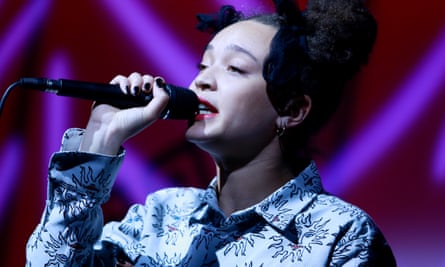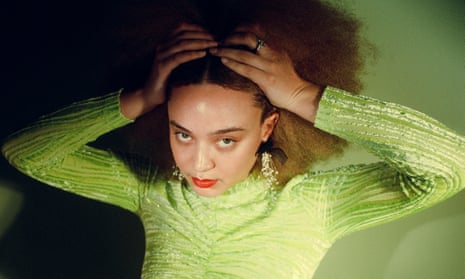The pandemic temporarily spelled game over for emerging pop stars: who could compete for headlines and livestreams with the likes of Dua Lipa? For Connie Constance, it stalled a career she had only just jump-started. A few months earlier, the Watford-born songwriter broke ties with AMF, then an imprint of Virgin EMI, the major label that released her 2019 debut album, English Rose, when she felt sidelined. She spent the last of her money on a trip to Los Angeles, writing songs, networking and restoring her musical confidence. Back home, her manager secured a distribution deal that would allow her to start her own label. She was raring to go. “Then Covid came in and I was like: ‘No!’” she hoots, thrusting her hand towards her webcam. “What? How is this happening!”
In lockdown one, writing songs became difficult again. “The lyrics that were coming out were just so dead,” says the quick-to-laughter 26-year-old who was born Constance Power, video-calling from her boyfriend’s place in London. So she left music alone and “made loads of mansions on Sims 4”. Then a host of social issues bubbled up – Black Lives Matter following the murder in the US of George Floyd, Marcus Rashford’s free school meals campaign – that spoke to a woman who once said she found politics boring.
“That is a naive comment I made when I was younger, but at the same time it is true,” says Power. “None of the characters in politics get me enthused to go and make change in my world. But this [past] year I feel like there’s been a lot more relatability and young people coming together to talk about how they feel about things, rather than on their own trying to have a voice.”
It revived her songwriting, most notably producing Prim & Propa, the title track of a new EP and a strikingly effective combination of disparate strains of British pop: the quasi-spoken verses bristle with the barked beauty of Paul Weller; the cathartic chorus reaches Florence-worthy heights. The lyrics feel like Nathalie Olah’s polemic Steal As Much As You Can in pop form: a working-class songwriter declaring that she plans to be more than she has been told she can be, but has no interest in middle-class aspiration or respectability. “We only ever had just enough but I guess it left more room for love,” she sings, voice gruff and nimble.
Power acknowledges her mother as “a warrior” in the lyrics. “She works in charity and worked throughout lockdown,” she explains. “You look on Instagram and you’ve got celebrities on their yachts and living their best life, then there was a family my mum was dealing with that’s barely surviving. The Marcus Rashford school meals thing also reminded me of my own upbringing; how would we have survived if we didn’t have that when we were younger? That’s what’s behind Prim & Propa: I’m so lucky that I had a loving family and a solid community because these people aren’t really helping us out over there.”
BBC Radio 1 named Power artist of the month for August, and played Prim & Propa every day. It was a massive vindication for Power and her two-person team. “At this stage, we’ve done more damage than Virgin has ever done with all of their money and all of their access,” she says. “We’ve killed it.”
In June, Power tweeted her support after the UK pop star Raye vented about her major label, Polydor, not letting her release a debut album seven years and a dozen massive singles after signing. “So lucky I got out of my deal that shit suffocated my whole being,” Power wrote. “Big Love for @raye speaking out.”
Power has never been shy about rejecting institutions that don’t work for her and working determinedly for what she wanted. (“I think that’s from my mum as well,” she says.) She danced as a child, an emotional outlet as the only mixed-race kid in a predominantly white area, wondering why her dad was often absent. She quit sixth form after being denied her chosen subjects and went to a prestigious dance school. She and a mate worked through college as staff at the Lion King musical, thinking they had hacked their future: “This is the only musical we can do anyway cos we’re flipping Black and mixed race,” she says. “We’ll watch all the moves, the songs, and we’ll walk the audition.” She hated that, too, and left after realising that the music she had been making with the producer Blue Daisy was what she really wanted to do.
She honed her writing and singing, and regularly practised Alicia Keys’s If I Ain’t Got You to see if she had improved. “That was my yardstick. But then what I realised I liked was when I could hear someone’s speaking voice – that’s what grabbed me to Amy Winehouse and Lily Allen, even Adele.”
It led Power to her rough-hewn vocals, a distinctive quality that attracted label interest. At the time she was partying regularly in the West End with a group of girls that included the young Dua Lipa. (“I remember when she came in the club one night and was like, ‘Guys, I’ve just signed a deal with Warners!’ We all got really drunk.”) Power had interest from the label as well but went with Virgin because, “we liked the people”, she says, laughing so hard she struggles to speak. “At the start.”
Power says she was made to feel difficult and went into “stubborn Con” mode, invoking a teenage idol: “Naomi Campbell doesn’t care if people call her hard to work with. If that’s how they’re gonna see me, I need to protect myself.”

Power and her manager strategised to try to get their way. Meanwhile, the label pushed Power – who loves Arctic Monkeys and covered the Jam on her debut album – towards pop and R&B and made mindless comparisons to other mixed-race artists. “They kept saying Corinne Bailey Rae. I really love her and listened to her growing up – I don’t sound like her at all. You’re just looking at me as a mixed-race girl with fluffy hair and going, ‘It’d be cute if we put some flowers in your hair and make you do some cute soul stuff that doesn’t stir the pot.’ That’s definitely how I felt.”
She says nobody at the label ever asked about her wellbeing. “If anything, if I sent an email saying I’m unhappy, it’s like” – she gasps – “‘Why is Connie saying this stuff? Get control of your artist.’ That’s what my manager was getting all the time.” A spokesperson for EMI, previously the parent company of the now inactive AMF, says this is “the first we’ve heard of Connie’s concerns”, and that they could not comment as AMF is no longer part of EMI.
Black British women have often struggled to find a foothold in mainstream British music outside R&B. It’s not Power’s problem to solve, but she knows why: “Black women have always been in all different genres of music, so it’s not new,” she says, “but in the commercial eye, if any female of colour wants to make music that isn’t R&B, it seems new because there’s no point of reference where it’s won.”
It will be interesting to see whether Arlo Parks winning the Mercury prize changes things. “‘Let’s go find some more Black girls with short hair who can do the same sound!’” Power deadpans. “Hopefully it’s more like: ‘Oh yay, Black people can make indie music’,” she laughs, feebly.
Her new songs mounted up but went unreleased; Power admits to starting a Soundcloud account under an alias just to feel heard. Her debut album won international acclaim but she felt her team had lost interest. She stopped thinking about music and focused on escape. “The problem is, people are playing with your career as if it’s not your entire life. I can’t do anything else.”
Power is spending the rest of the year writing her second album. Rewatching the MIA documentary inspired her to focus on more identity-based material; one new track is called Afro Hair. “It’s about feeling silenced because you get looked at as an angry Black woman and a stereotype,” she says.
One of the best things about running her own label, she says, is never having to ask permission. She named it Jump the Fence after a lifelong mantra: breaking into abandoned houses as a kid, leaping into a farmer’s field, sneaking through a club’s back door. “That’s the epitome of how I move in life,” she says. “I like to take the risk, to go for it into the unknown and see what comes about.”
